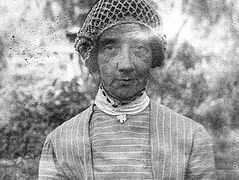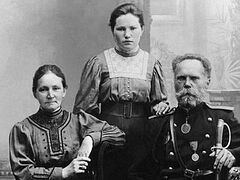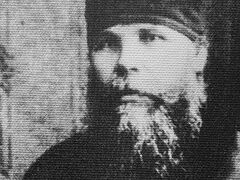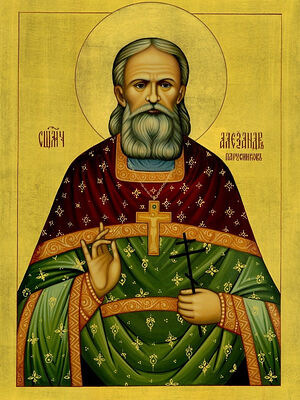 Icon of Hieromartyr Alexander Parusnikov The granddaughter of Hieromartyr Alexander Parusnikov, Priest of Ramenskoye (commemorated June 27), Alexandra Viktorovna Fomicheva recently saved her holy grandfather’s house from demolition. Batiushka’s pious descendants greatly honor the memory of their relative. They have preserved valuable memories, photographs and personal possessions of Fr. Alexander and his family. Thus, today we have the opportunity to delve into the life of one of the new martyr and feel his invisible presence.
Icon of Hieromartyr Alexander Parusnikov The granddaughter of Hieromartyr Alexander Parusnikov, Priest of Ramenskoye (commemorated June 27), Alexandra Viktorovna Fomicheva recently saved her holy grandfather’s house from demolition. Batiushka’s pious descendants greatly honor the memory of their relative. They have preserved valuable memories, photographs and personal possessions of Fr. Alexander and his family. Thus, today we have the opportunity to delve into the life of one of the new martyr and feel his invisible presence.
The future Hieromartyr Alexander Parusnikov was born in 1879. He was the second to last—the twelfth—child in the family of Priest Sergei Parusnikov and his wife Alexandra Gerasimovna. The family lived in the village of Troitsko-Ramenskoye—now it is the picturesque and cozy town of Ramenskoye in the Moscow region [situated twenty-nine miles southeast of Moscow.—Trans.].
His pious mother Alexandra Gerasimovna died of tuberculosis at the age of forty-six, and the upbringing of the children fell on the shoulders of the eldest sister Olga, who selflessly took care of her younger siblings, and then of her nephews and nieces.
Although Alexander received a theological education, he did not intend to become a clergyman; but he submitted to the will of his father, who wanted his son to become his successor at the Holy Trinity Church next to their home.
At a Christmas Ball Alexander met his future wife Alexandra Ivanovna Pushkareva. She was a clever young lady, and the owner of the Ramenskoye textile and weaving mill where her mother worked. Her mother arranged for Alexandra to attend the Moscow Diocesan Women’s School named after Metropolitan Philaret (Drozdov), and after graduation Alexandra Ivanovna became a primary school teacher.
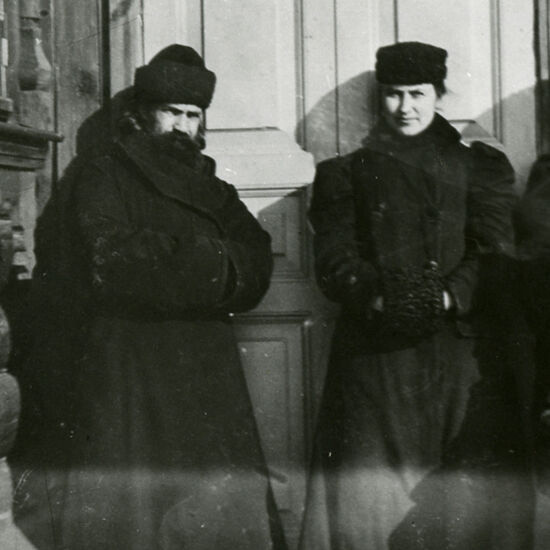 Fr. Alexander and his wife Alexandra at the door of their house, 1910
Fr. Alexander and his wife Alexandra at the door of their house, 1910
How non-acquisitiveness saved the good pastor’s family from starvation
Fr. Alexander was noted for his special faith in Divine Providence and his conscientiousness, and when he would go to perform services of need and see the need in which these families lived, he did not even take food from them, although his wife repeatedly reminded him that there was nothing to eat in their home.
When tough times came and the clergy had no voting rights, and were therefore not entitled to receive food cards, the Parusnikov family had a very hard time, because batiushka and his wife were raising ten children. On Christmas Eve their large family found two bags of bread, cereals and potatoes on their doorstep. Thus the Heavenly Father strengthened His faithful children.
After the cow—their only provider—was taken away from the family, batiushka showed by his example how to fulfill the Apostle Paul’s commandment: In every thing give thanks (1 Thess. 5:18). He invited his children to kneel down and celebrated a thanksgiving prayer service to St. Nicholas the Wonderworker. The answer from the merciful saint was not long in coming. From that day on, every morning a basket with milk and bread would appear on the doorstep of their house.
A good fruit from a good seed
In the late 1920s, half of Fr. Alexander’s house was seized, and a policeman who had serious case of tuberculosis was settled there. What he did will make you involuntarily tremble. The policeman went to the side of the house where batiushka’s family lived and spat. Alexandra begged him on her knees to pity the children, but he would only say mockingly, “The priest’s bastards must die.”
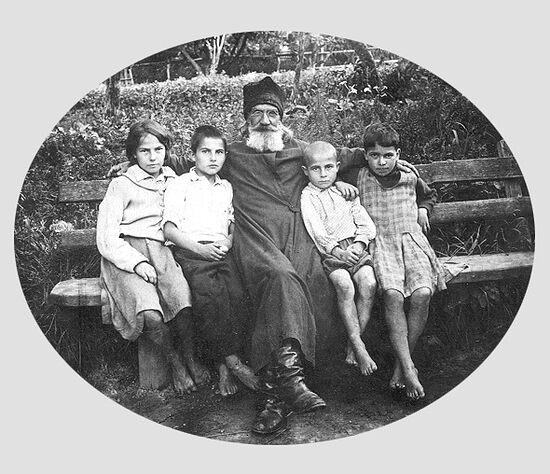 Archpriest Alexander Parusnikov with younger children
Archpriest Alexander Parusnikov with younger children
All ten of batiushka’s children got tuberculosis, and after the war the eldest sons in the Parusnikov family died in turn every year. Only five children survived—two sons and three daughters. One of them, Tatiana, had a daughter, Alexandra (it was probably no coincidence that she was given this name). Their family cherishes the personal possessions of Hieromartyr Alexander. They also registered the Society for the Preservation of the Memory of the New Martyrs Alexander and Sergei of Ramenskoye and saved Fr. Alexander’s house from demolition. Now reconstruction is underway there, and in their free time the new martyr’s descendants hold guided tours and share a piece of family history with the faithful.
Confessors from childhood
Fr. Alexander’s daughter Tatiana, despite the hostile attitude towards the Church in the Soviet era, never concealed that she was a priest’s daughter, and was even especially proud of it. Tanya [a diminutive form of the name Tatiana.—Trans.] acquired this steadfastness as a child; batiushka’s children did very well at school, but they suffered humiliation for their father’s vocation—they were deprived of breakfasts and were seated together with other priests’ children on a separate bench, apart from the other children.
Once, as Fr. Alexander was walking with his daughter and holding her hand, passers-by spat after him. Seeing his daughter’s pain, batiushka comforted her quietly, “Never mind, Tanya. This is going into our receptacle.”
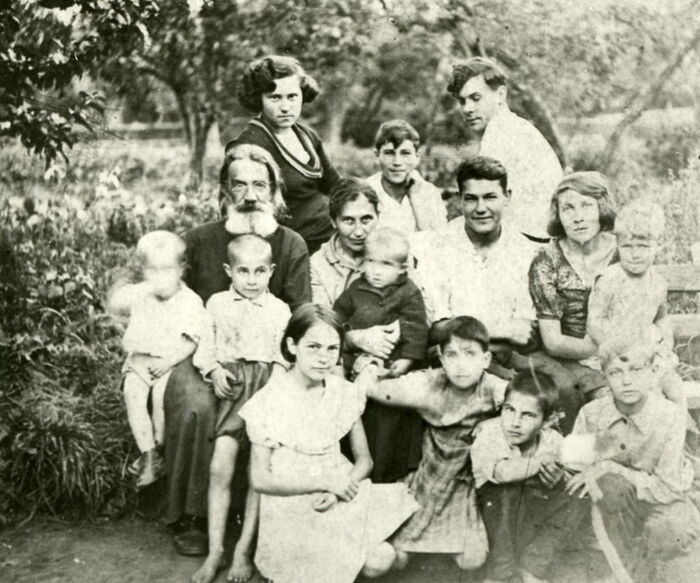 Fr. Alexander and his wife Alexandra with children in the garden
Fr. Alexander and his wife Alexandra with children in the garden
Batiushka was very kind and affectionate to his children, never punished them, but would only say, “Don’t argue, don’t argue with each other.” Parishioners loved and respected him, and for his long and exemplary ministry he was elevated to the rank of archpriest and awarded the miter.
“I miss you to the point of death...”
In 1938, Fr. Alexander was arrested, interrogated and tortured so cruelly in prison that his teeth were knocked out. But the guards sympathized with the confessor, and one of the policemen arranged a meeting between Fr. Alexander and his wife. Batiushka sent his family several notes from prison—to his wife, eldest son Sergei, and the younger children. These notes have been preserved by the Parusnikov family to this day, and Tatiana and her sister have copied them several dozen times. Here they are:
“Dear Sasha, thank you for the happiness you have given me. Don’t cry for me—it’s God’s will.”
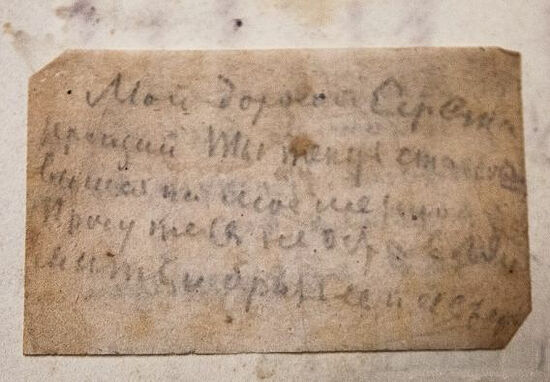 Letter to the eldest son Sergei
Letter to the eldest son Sergei
“My dear Seryozha, goodbye. You’re taking my place now. I ask you not to leave your mother and siblings, and God will bless you in all your undertakings. I miss you to the point of death, once again goodbye.”
“My children, I kiss you all and hold you tightly to my heart. Love each other. Honor the older ones, take care of the younger ones. Protect your mother with all your might. God bless you.”
After the investigation, Fr. Alexander was transferred to Moscow. Tatiana saw her father at the train station, hugged his emaciated body, and then rushed and informed her mother. Alexandra Ivanovna caught up with her husband and rode in the train together with him and the escort; halfway there the escort allowed the spouses to sit together. That was their last conversation. In the summer of 1938, Fr. Alexander Parusnikov was sentenced to execution by firing squad, which took place at the Butovo firing range on June 27, 1938.
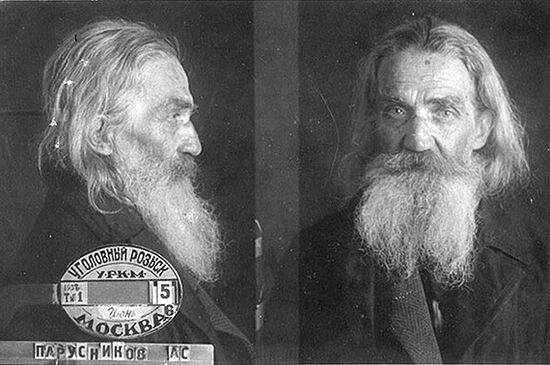 Photo from the investigative case, 1938
Photo from the investigative case, 1938
Through the efforts of the hieromartyr’s daughter, Tatiana, his granddaughter Alexandra and all the other relatives, we have the opportunity to touch the era of suffering of the Russian people, to feel this bitterness, but also to marvel at the steadfastness of the faithful of that time.
For us this is an amazing example of how important it is to keep the memory of your roots, to ask your grandparents things, to make notes. Perhaps there are sufferers and honest confessors among our pious ancestors whose prayers strengthen and support us in the sea of life.

